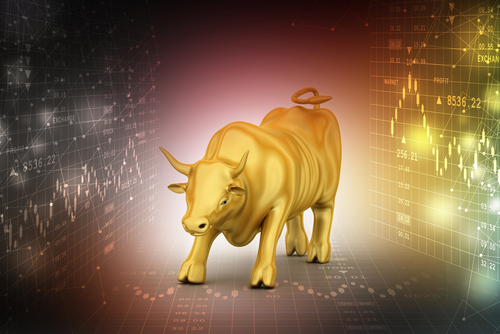The investing world has its own unique language. While some terms are unfamiliar, such as standard deviation or P/E ratio, other words are recognizable, such as bear or bull market. However, the meaning of these phrases is not obvious. Both phrases refer to how the stock market is performing; however, bulls and bears are quite different animals.
What is a bull market?
A bull market is one in which investment prices continually rise over an extended period of time, usually months or years. It can apply to anything that is traded, such as real estate, commodities, or currencies.
Bull markets are considered periods of optimism that usually happen when economic conditions are favorable, such as when gross domestic product (GDP) is high, unemployment is low, and corporate profits are up. Such factors cause investors to feel confident about market opportunities. In other words, investors are “bullish” in these circumstances, which results in greater demand for stocks. This increased demand pushes stock prices up and as prices rise, so do investors’ appetites.
How long do bull markets last?
There is no set definition for how long prices go up before a market is considered a bull market. However, a bull market is generally defined as a market where stock prices rise by 20%, following a 20% decline. It ends when stock prices decline by 20%. This means that the dates of a bull market can only be known when it ends. The most recent Bull market in the U.S. started in 2009 and lasted for over 10 years. This is also the longest bull market run in stock market history. Unfortunately, historically Bull markets come to an end, and it can be extremely difficult to predict when that end will happen.
Should you buy during a bull market?
Investing in stocks during a bull market can be profitable, as prices continually rise. Losses tend to be minor and usually recover quickly. This is particularly true of investments made early in the bull market. However, it is notoriously difficult to time the market.
It can be extremely difficult to predict when a bull market will end and a bear market will begin. A basic investment strategy is to buy and hold, as historically the stock market increases over time.
Bull vs. bear market: What’s the difference?
A bear market is the opposite of a bull market. It is a period of price declines, which usually takes place during unfavorable economic conditions, such as a slowing economy and higher unemployment. Demand for stocks decreases during a bear market as investors fear losses, and prices therefore drop.
If you are curious about the terms bull and bear, here is an explanation. One theory is that they are named after the way these animals attack. Bulls thrust their horns up, indicating the upward movement of the markets, while bears swipe down, reflecting the downward market move.
Learn More
Looking to improve your investing knowledge? Learn more about basic investing concepts and strategies with our easy-to-understand explanations.
Please let us know if you have any topics that you would like us to cover.
Twitter | Instagram | Facebook | TikTok | LinkedIn | Support









